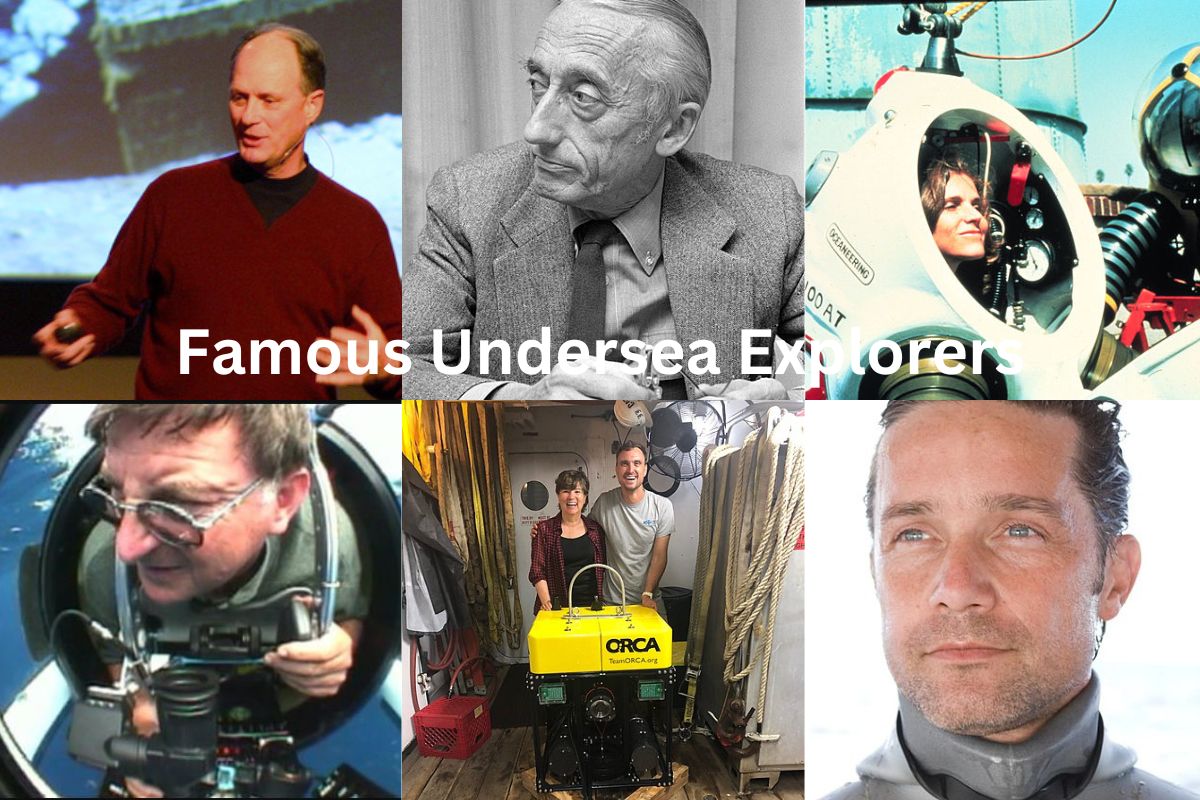Undersea explorers are adventurers who are fascinated with the mysteries and wonders of the ocean. Divers, remotely operated vehicles (ROVs), and submarines are some of the tools that these explorers employ to investigate the ocean floor and its depths. Scuba diving is another approach.
Exploration of the ocean’s depths has resulted in a significant advancement in our knowledge of the ocean and the ecosystems that live inside it, as well as in a number of significant new scientific findings.
People who have made substantial contributions to the field of underwater exploration include:
- Jacques Cousteau
- Robert Ballard
- Sylvia Earle
- James Cameron
These intrepid travelers have sparked a lifelong fascination among succeeding generations of researchers and thrill-seekers with the ocean and the wondrous world that lies beneath its surface.
Famous Undersea Explorers
1. Jacques Cousteau
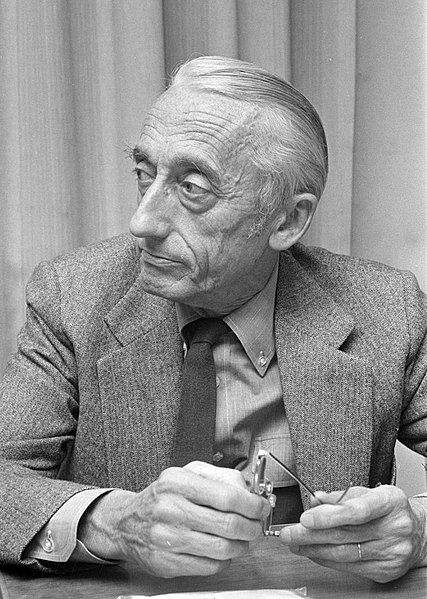
Jacques Cousteau was a French marine explorer, conservationist, and filmmaker who was most known for his groundbreaking work in underwater exploration and attempts to raise awareness about the need of ocean conservation. He was born in Saint-André-de-Cubzac, France, in 1910, and died in Paris in 1997.
Cousteau began his career as a naval officer, but he quickly became interested in underwater research, creating the Aqua-Lung, which allowed divers to breathe underwater without the use of a hose.
Cousteau and his colleagues were able to explore the depths of the oceans and make a number of groundbreaking discoveries, including the first film footage of sharks and the discovery of new fish species, thanks to this technique.
Also Read: Exploration Ships
Cousteau’s documentaries and videos were also utilized to raise awareness about ocean conservation and the need to safeguard marine habitats from pollution and overfishing. His most famous documentary, “The Quiet Planet,” earned an Academy Award in 1956 and helped raise global awareness of marine conservation issues.
The legacy of Jacques Cousteau inspires future generations to explore and safeguard the world’s waters. He was a vocal advocate for ocean conservation as well as a pioneer in marine exploration and filming. His name has come to be associated with the sea and the wonders that lay beneath its surface.
2. Robert Ballard
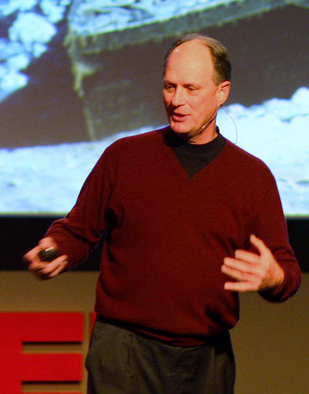
Robert Ballard is an American oceanographer and explorer best known for locating the RMS Titanic’s wreck in 1985. Ballard, who was born in Kansas in 1942, grew interested in oceanography at a young age and later earned a Ph.D. in the topic from the University of Rhode Island.
Throughout his career, Ballard has led multiple expeditions and made numerous discoveries. He has discovered several additional ships, including the German battleship Bismarck, the aircraft carrier USS Yorktown, and the PT-109, the World War II patrol boat commanded by John F. Kennedy.
Ballard has also been involved in a number of scientific and educational endeavors, including the creation of the JASON Project, which provides science instruction to classrooms worldwide.
Throughout his career, Ballard has been a trailblazer in the science of oceanography, making significant contributions to our understanding of the seas and their secrets. He is known as one of the most influential figures in ocean exploration history, as well as an ardent champion for education and scientific research.
3. Sylvia Earle
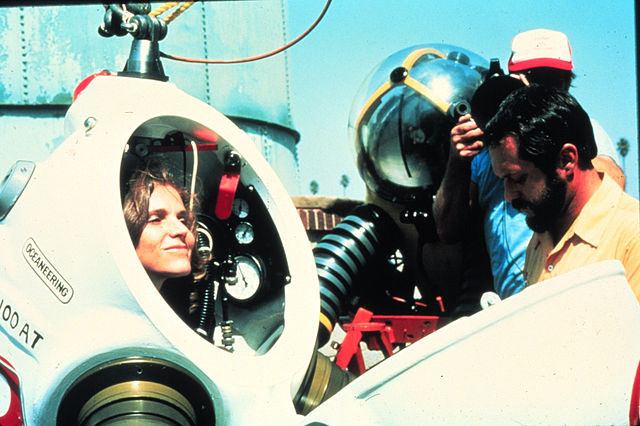
Sylvia Earle is a marine biologist, oceanographer, and explorer from the United States who has made substantial contributions to the fields of deep sea research and ocean conservation. She is often referred to as “Her Deepness” due to her lengthy work in the deep sea.
Over her career, Earle has been involved in a variety of oceanographic research projects and trips. She holds multiple deep-sea diving records, including a solo dive to 1,000 meters in 1979.
Also Read: Famous Female Explorers
Earle has also been a pioneer in the development of underwater equipment, such as the JIM suit, a one-person atmospheric diving suit that allows divers to work for lengthy periods of time at tremendous depths.
Earle is an outspoken supporter of ocean conservation and has been involved in a number of projects to protect and preserve marine habitats. She developed the Deep Ocean Exploration and Research (DOER) program, which uses technology to explore and research the ocean, as well as Mission Blue, a global ocean conservation alliance.
Earle has won numerous prizes and distinctions for her contributions to marine research and conservation, including the Hubbard Medal from the National Geographic Society and the TED Prize. She is still inspiring and educating people all over the world about the need of safeguarding the ocean and its sensitive ecosystems.
4. William Beebe
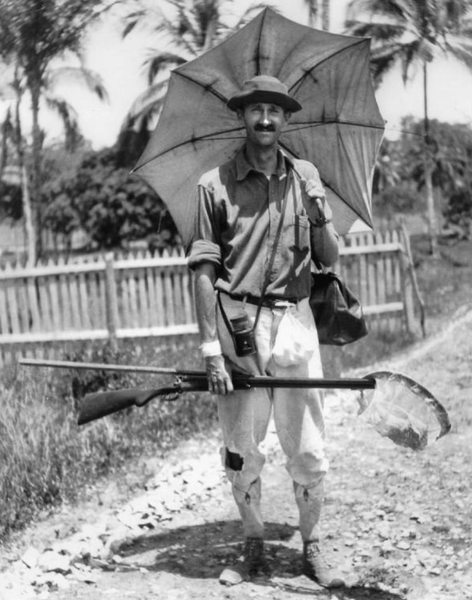
William Beebe was an American scientist, adventurer, and writer best known for his work in deep-sea research. Beebe was one of the first scientists to investigate the ocean and its creatures using a bathysphere, a submersible that could be dropped to tremendous depths.
Beebe and engineer Otis Barton dived to a depth of almost 800 meters in the bathysphere in 1930, setting a record for the deepest human dive. Beebe performed multiple other dives in the bathysphere, discovering numerous new fish and other marine life species.
Beebe was also a prolific writer who published several novels about his ocean adventures, including “Half Mile Down” and “The Arcturus Journey.” He was an outspoken proponent of the study and conservation of the ocean and its ecosystems.
Beebe’s contributions to deep-sea exploration helped pave the way for future generations of scientists and explorers. Several others were motivated by him to learn more about the ocean and the wonderful world beneath the waves. Beebe died in 1962, but his reputation as a pioneering explorer and ocean conservationist goes on.
5. Don Walsh
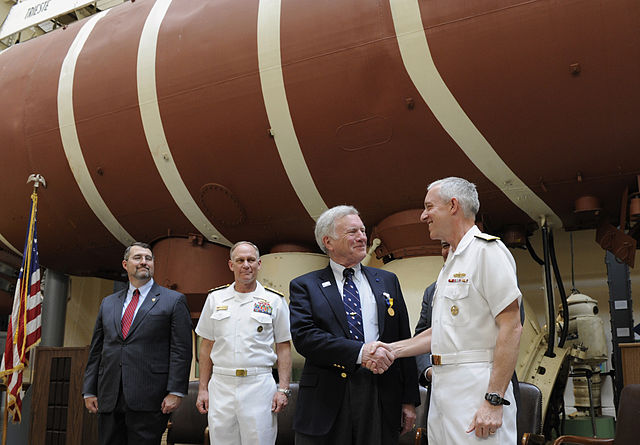
Don Walsh is an American oceanographer and explorer most known for being one of the first two humans to reach the Mariana Trench’s deepest point, the Challenger Deep.
Walsh and Swiss engineer Jacques Piccard guided the bathyscaphe Trieste to the bottom of the 35,000-foot-deep Challenger Deep in 1960. The dive lasted over five hours and was the first time someone had reached the ocean’s bottom. The dive revealed important details on the geology and biology of the ocean’s deepest point.
Throughout his career, Walsh has been involved in a number of oceanographic research projects and trips. He worked for the US Navy and was the director of the International Maritime Institute at the University of Hawaii.
Walsh has won various accolades and honors for his services to oceanography and exploration, including the Hubbard Medal and the Explorers Club Medal from the National Geographic Society. He is still an advocate for ocean exploration and conservation, and he has encouraged many people to learn about the ocean’s wonders.
6. Edith Widder
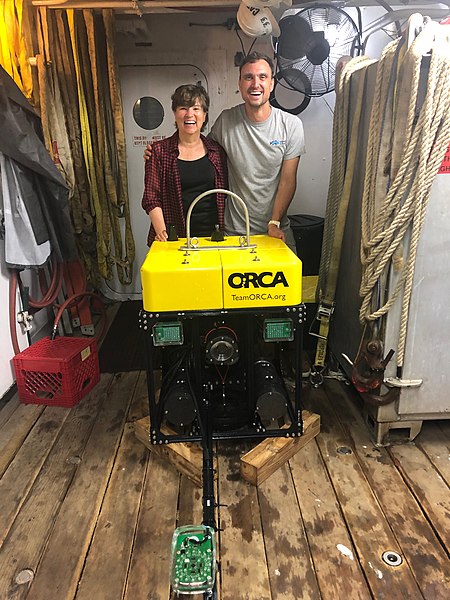
Edith Widder is a marine scientist, oceanographer, and inventor from the United States who has made important contributions to the field of deep-sea exploration. Widder is well-known for her studies on bioluminescence, or the capacity of living organisms to emit light.
Widder is a co-founder of the Ocean Research & Conservation Association (ORCA), an organization dedicated to the protection and preservation of marine habitats. She has also participated in various excursions and scientific projects, including the excavation of deep-sea trenches and the identification of new bioluminescent animal species.
Widder’s creation of the “Medusa” camera system, which employs red light instead of white light to capture photographs of deep-sea species without disturbing them, was one of her most significant contributions to undersea exploration. The technology has been used to acquire photographs of previously unknown deep sea organisms and activities.
Widder has received a number of honors and prizes for her contributions to marine science and technology, including the renowned MacArthur Fellowship. She has also spoken at TED about the significance of protecting the ocean and its ecosystems. Many individuals have been motivated by Edith Widder’s work to learn more about the ocean and act to preserve its delicate balance.
7. Philippe Cousteau Jr.
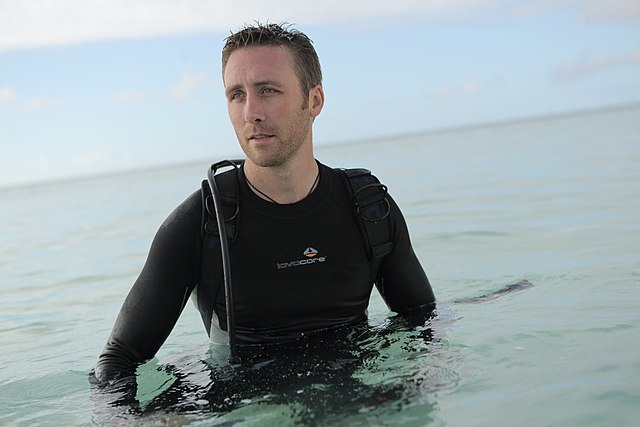
Philippe Cousteau Jr. is an American environmentalist, oceanographer, and television broadcaster who has carried on his grandfather, Jacques Cousteau’s, heritage of ocean exploration and advocacy. Philippe Cousteau Jr. is the son of Philippe Cousteau Sr., who perished in a plane disaster when he was just four months old.
Philippe Cousteau Jr. is the co-founder and CEO of EarthEcho International, a non-profit organization dedicated to environmental education and campaigning for long-term solutions to environmental issues. He is also a TV broadcaster, having hosted various series such as “Going Green” and “Oceans Blue.”
Cousteau has participated in various expeditions and research initiatives as an oceanographer, including the discovery of deep-sea ecosystems and the influence of climate change on the ocean. He is an outspoken supporter of ocean conservation and has spoken internationally about the necessity of safeguarding the ocean and its people.
Cousteau has received multiple honors for his environmental activism, including the Gulf of Mexico Foundation’s 2018 Coastal Visionary Award and the United Nations Global Leadership Award in 2019. He continues to motivate and educate people all over the world about the necessity of safeguarding the ocean and its fragile ecosystems.
8. Graham Hawkes
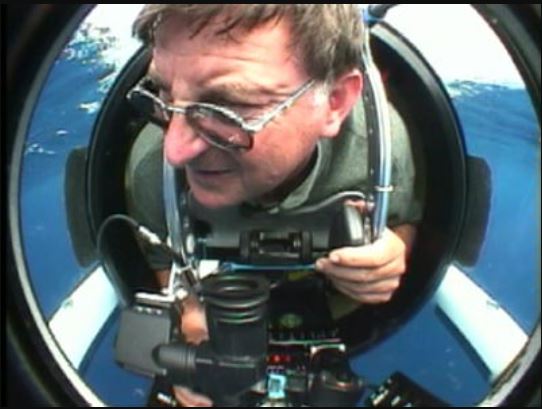
Graham Hawkes is a British-born ocean explorer and engineer who has made important contributions to the field of deep-sea exploration. Hawkes is well-known for inventing and building groundbreaking deep-sea submersibles that have allowed scientists and explorers to reach previously unthinkable depths.
Hawkes began his career as an engineer in the aerospace sector, but in the 1970s, he grew interested in underwater technology and began constructing submersibles.
Hawkes Ocean Technologies, which he started in 1996, has subsequently produced a series of innovative submersibles utilized for scientific study and exploration.
The Deep Flight series is one of Hawkes’ most famous submersibles, with an innovative design that allows it to “fly” through the water like an airplane.
Deep Flight submersibles are capable of reaching depths of up to 1,500 meters and have been employed for a number of reasons, including oceanographic research and shipwreck excavation.
Hawkes has also participated in a number of missions and research endeavors, including the finding of deep sea hydrothermal vents and the excavation of the Titanic crash site.
For his contributions to submarine exploration and technology, he has received various prizes and distinctions, including the coveted Rolex Award for Entrepreneurship. Hawkes is still working on revolutionary ideas and technology that push the limits of what is feasible in submarine exploration.
9. Fabien Cousteau
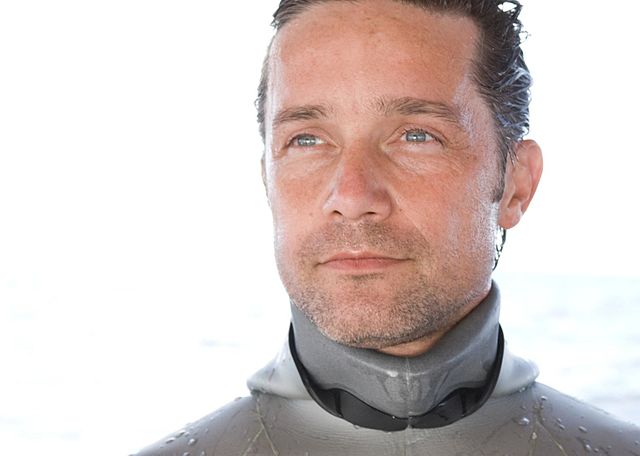
Fabien Cousteau is a French-American ocean explorer, filmmaker, and environmentalist who has carried on his family’s history of ocean exploration and advocacy. He is Jacques Cousteau’s grandson, the famous oceanographer and innovator who pioneered underwater exploration.
Fabien has conducted multiple excursions to investigate and film marine species, including Mission 31, a 31-day underwater mission in which he and his team lived and worked in an underwater environment off Florida’s coast. The mission’s purpose was to investigate the effects of climate change and pollution on marine ecosystems.
Fabien is an advocate for ocean conservation and education in addition to his efforts in ocean exploration. He established the Fabien Cousteau Ocean Learning Center to promote ocean conservation via educational and outreach initiatives.
Fabien has also produced other ocean-related films and documentaries, including “Sharks: Mind of a Demon” and “Sharks: Mind of a Demon 2.” For his efforts to ocean exploration and conservation, he has received various accolades and honors, including the 2016 National Geographic Emerging Explorer Award. Fabien Cousteau continues to inspire and educate people all across the world about the necessity of safeguarding the ocean and its fragile ecosystems.
10. James Cameron
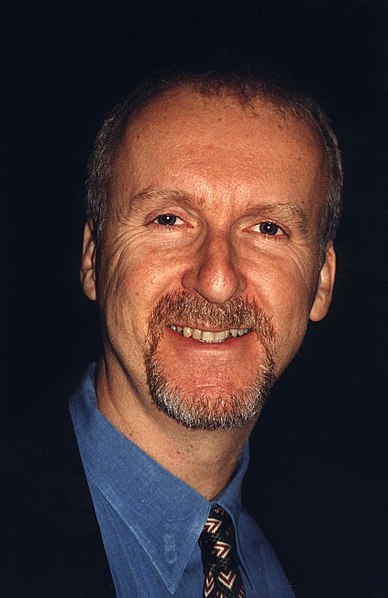
James Cameron is a Canadian filmmaker, explorer, and environmentalist with a keen interest in deep-sea exploration. He has conducted multiple excursions to the ocean below and is regarded as one of history’s most successful underwater explorers. His most significant excursions are the exploration of the Titanic wreck site and the Mariana Trench, the deepest portion of the ocean.
The film “Titanic,” directed and co-produced by James Cameron in 1995, recounts the story of the renowned ship that perished in 1912. He grew fascinated by the Titanic’s history and mystery, and in 1997, he led an expedition to the ocean’s bottom to study the crash site. He made multiple excursions to the site, where he used his deep-sea expertise to shoot the wreck and undertake scientific research for the film.
James Cameron created history in 2012 when he completed a solo dive to the Mariana Trench, the deepest portion of the ocean. He piloted the Deepsea Challenger, a specially constructed submersible, to the bottom of the 36,000-foot-deep trench. This was only the third manned dive to the trench and the first solo dive.
James Cameron is an environmentalist who is deeply committed to ocean protection. He established the Avatar Alliance Foundation to help environmental concerns and has used his celebrity to draw attention to the problem of ocean pollution and overfishing. He believes that the ocean is the last frontier on Earth, and that exploring and protecting it is critical to the planet’s survival.
